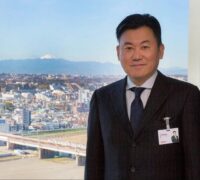Focusing on the facts to tailor a new future for fashion
PVH’s Stefan Larsson on his approach to rebuilding the apparel business, sustainably...
YouTube
February 22, 2023 in CEO Dialogue Series
Mickey Mikitani tells IMD President Jean-François Manzoni how he has grown Rakuten from an e-commerce startup into an ecosystem spanning internet services, fintech, and mobile....
Twenty-six years ago, Mickey Mikitani quit his position at the Industrial Bank of Japan – an unusual move in the traditional world of Japanese corporate culture. Even more surprisingly, he left not to join another large institution but to pursue an idea he had for an e-commerce startup.
Today, from humble beginnings with just six employees and a single server, his idea has mushroomed into Rakuten (meaning optimism in Japanese), a business ecosystem with 31,000 employees and revenues last year of about $15bn.
With divisions across internet services, fintech, and mobile, Rakuten is at the epicenter of the global shift towards a digital economy, bringing technology and new ways of delivering services to industries as diverse as travel, advertising, banking, and television. Its mission is “to contribute to society by creating value through innovation and entrepreneurship”.
In the process, Mikitani has often proved doubters wrong by disrupting industries with new approaches and models for doing business. And now, he is betting big once again with the launch of Rakuten Mobile, Rakuten’s own mobile network operator in Japan, and Rakuten Symphony, which offers cloud-native virtualized mobile network technology to operators around the world.

The idea, he says, is to shake up the sector by using edge and cloud technologies to build networks at speed. In 2021, Rakuten signed a multi-year contract to build, run, and maintain a fully virtualized network for Germany’s 1&1 AG – its first major overseas contract to export its network-building technology.
“This industry is very old,” he says of the telecoms sector. “We had this concept of transforming the definition of wireless connectivity, which we call mobile as a software. We have decided to take this big challenge as one of our moonshot projects.”
The coming years will determine its success. But in the meantime, how does Mikitani steer a course between innovation and entrepreneurship and the demands of often-impatient shareholders? As a recent reminder of divergent opinions over strategy, Rakuten’s push into Japan’s crowded mobile market and Rakuten Symphony (a B2B-services company offering next-generation, cloud-based virtual networks) has drawn market skepticism – along with an accompanying slide in the group’s share price.
“It’s very important to listen to people, but you don’t want to just follow the general consensus,” he says, unfazed. “I’m a challenger, and we have a vision not to be trapped by conventional wisdom. We are not afraid of doing things in a different way. That is the biggest difference between us and other Japanese companies, or even among most internet startups – we do moonshot projects.”
The “us” is a potentially tricky word to describe what many analysts call a conglomerate – a label that invariably begs questions about whether the whole adds up to more than the sum of its parts. What is it that helps to hold such a wide collection of businesses together?
One is Mikitani’s focus since the start on lifetime value (LTV), or the average revenue a customer is expected to generate over their lifetime compared with the customer acquisition cost (CAC). Making that ratio work involves seeing customers as members, providing incentives to use, and move within, the Rakuten Ecosystem via a comprehensive rewards system. Buying from the Rakuten Ichiba online marketplace, using Rakuten Bank or a Rakuten Card, or planning a trip using Rakuten Travel generates points that members can use, say, to pay their Rakuten Mobile phone bill.
“Rakuten is not an e-commerce company, nor a fintech company nor a mobile company,” Mikitani says.
Rakuten is a membership company, and the rewards program we have created is about the brand.
The companies within the Rakuten Ecosystem have the name “Rakuten” in their title, and Mikitani is relentless in raising brand awareness through publicity and, in particular, sponsorship in sport: Rakuten is an official partner of seven-time NBA Champions Golden State Warriors, and for five years the company name was writ large on the shirts of top-flight soccer team FC Barcelona. “Building a brand is expensive,” says Mikitani. “Associating our brand with very special sports organizations is critical to getting our brands known.”
But he also says that sponsoring great teams sends a message that goes to the heart of two themes encapsulated in his leadership philosophy. The first speaks to one of the group’s five “brand concepts”: solidarity. “We function as a team,” Mikitani explains of the Rakuten Ecosystem. “Each player, each business, has a different character, different strengths, and different weaknesses – but we reinforce each other as one.”
The second theme is to contribute to society – a strong social purpose that echoes the beliefs of his father, who was quoted as saying that a corporation’s most important mission was to contribute to humanity. It is a philosophy Mikitani seems determined to continue. “We care about people, we care about community, we care about society,” he says. Rakuten has a strong philanthropic thrust, and the group has a strategic partnership with almost all of Japan’s prefectures.
But for Mikitani, contributing to society also involves speaking out on issues he believes are limiting Japan’s potential to compete on the international stage. “We have to change many, many things and become more capital friendly. Unfortunately, most business associations have large, vested interests and they fear change,” he says. “We prefer change. We know that we need more dynamic policy, which may sometimes be associated with pain. But without change, Japan risks becoming one of the world’s B-rated countries.” He adds: “I’m hoping that Japanese leaders will wake up some day.”
Mikitani’s relationship with Japanese business culture is complex. Workers, both Japanese and non-Japanese, are expected to embrace the group’s values and principles, or Rakuten Shugi. Every Monday, for example, every employee, including Mikitani himself, helps to tidy their office, including wiping down the legs of their chairs. “You have to be persistent,” says Mikitani. “You need to repeat and you need to create practices, which are very important for preserving the good parts of Japanese culture across the operations.”
He also draws heavily on the Japanese trait of personal commitment. “The most important thing to staying entrepreneurial is accountability,” he insists. “It’s not my business, it’s not shareholders’ business, it’s our business. If it were a house, you’d clean your living room, your kitchen, and if there were dust on your chair, you’d wipe it off, right? Why wouldn’t it be the same with your office?”
Yet one of the key leadership decisions he took about a decade ago was to establish English as Rakuten’s default language, both for its overseas operations and for Japan itself. It was a controversial move, but Mikitani says that it was a necessary step in his ambition to instil an international perspective. “I don’t want my staff to just have a domestic lens,” he explained. “I want them to look at what’s going on in the world, and to learn from best international practices.”
Mikitani also sees English as the gateway to recruiting the very best global talent. “We cannot only hire the best and brightest engineers and scientists from Japan when the US and China are producing far greater numbers,” he says. “Of course, we could try to ask non-Japanese people to study Japanese, but I don’t think that would work.”
One of his five so-called Principles for Success is “Speed!! Speed!! Speed!!” – an approach that he believes is essential in business whether you succeed or fail. “It’s a matter not only of how you succeed fast, but also how you fail fast,” he said. “Failure, for me, is a learning experience. We learn something, we fix the business, or sometimes we retreat, but we learn something and we become stronger.”
How does he see Rakuten’s future, particularly given the apparent contrast between the group’s hitherto asset-light structure and the more-recent heavy investments generated by its decision to roll out its own mobile network?
Mikitani draws analogies with Amazon as a justification. “Asset-light is attractive, but at the same time it’s dangerous,” he said. “If you think about why Amazon is so strong, it’s because of their Amazon Web Services (AWS) infrastructure and their logistics capabilities. In some countries, it’s very difficult to compete with Amazon because they have invested so much. So has Google – their data centers are super capital-intensive.”
He also says that data generated by the Rakuten Ecosystem will play a pivotal role in the group’s success. “It’s not just search data,” he said. “We know people’s transactions. We have to be conscious about privacy, but at the same time we can leverage that data and expand.”
Is that a challenge he relishes or is all the drive and vision taking a toll? “I do like challenges,” he admitted. But he also pauses for thought. “Do I love my job? I don’t know… it’s more a sense of responsibility and duty. It’s something I have to do.”

Founder and CEO at Rakuten
Mickey Mikitani is a Japanese billionaire business magnate and writer. He is the founder and CEO of Rakuten, Inc. He is also the president of Crimson Group, chairman of the football club Vissel Kobe, chairman of Tokyo Philharmonic Orchestra, and a board member of Lyft.

IMD President
Jean-François Manzoni is the President of IMD, where he also serves as the Nestlé Professor. His research, teaching, and consulting activities are focused on leadership, the development of high-performance organizations and corporate governance.
September 28, 2021 in CEO Dialogue Series • 7 min read
PVH’s Stefan Larsson on his approach to rebuilding the apparel business, sustainably...
September 7, 2021 in CEO Dialogue Series • 5 min read
Klaus Schwab discusses the urgent need for stakeholders to collaborate to combat the climate emergency, cope with technological change and address skills gaps in an interview with Jean-François Manzoni, President of IMD...
August 2, 2021 in CEO Dialogue Series • 8 min read
Pascal Soriot says "climate change is the biggest threat to humanity” and discusses future-looking strategy with Alexion acquisition in exclusive interview on company’s turnaround....
July 6, 2021 in CEO Dialogue Series • 6 min read
Mark Schneider cites data suggesting that effects of climate change and biodiversity loss have shot to the top of the agenda....
June 3, 2021 in CEO Dialogue Series • 9 min read
Alexis Nasard extols the virtues of inclusive capitalism to create a society where everyone is a winner. Interview by Jean-François Manzoni ....
April 27, 2021 in CEO Dialogue Series • 6 min read
The former CEO of IT company Infotheek Group shares his secrets for successful M&A integration, picking the right bets, and saving time on emails....
March 23, 2021 in CEO Dialogue Series • 3 min read
LEGO Brand Group Executive Chairman says its strong performance during global lockdown this year was built on a deep-rooted culture of resilience and agility....
March 23, 2021 in CEO Dialogue Series • 1 min read
In an interview with IMD President Jean-François Manzoni, the head of Belgian chemicals multinational Solvay talks about how coronavirus could galvanize a much-needed international response to global warming...
August 12, 2020 in CEO Dialogue Series • 4 min read
The leader of the world’s largest container shipping group predicts that trade will recover quickly to pre-pandemic levels and grow slowly but steadily thereafter....
Explore first person business intelligence from top minds curated for a global executive audience